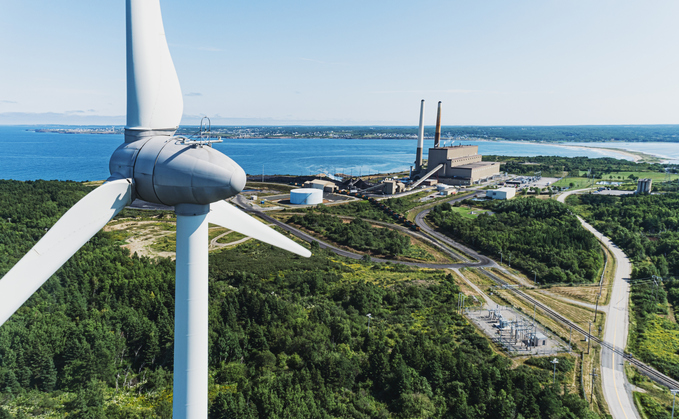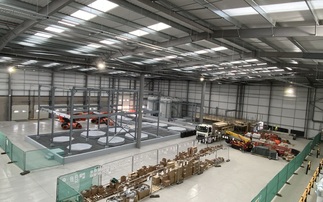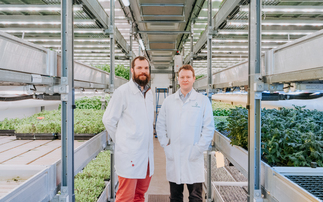
A wind turbine turns in the foreground of a coal fired power generating station | Credit: iStock
It is one of the most important, and yet under-reported aspects, of the net zero transition – how are the world’s supply chains responding to surging demand for the commodities needed to decarbonise the global economy? And what does the net zero commodities boom mean for business everywhere?
The net zero transition faces myriad challenges. There's the technological challenge of developing the products and services necessary to decarbonise. The infrastructure challenge of deploying them at pace and scale. The financial challenge of funding them. The skills challenge of developing a workforce capable of installing and operating them. The policy challenge of tackling free riders, minimising stranded assets, and maintaining competitiveness as the transition takes place. And the political challenge of building public support for what is set to be the biggest and fastest industrial revolution in history.
But underpinning the labyrinth the net zero transition is attempting to navigate is an issue hidden in plain sight: the commodities challenge.
Commodities are literally the building blocks of the global economy. They are the materials that make our buildings, the components inside our technologies, the fuels that provide our energy, and even the food we eat. And yet, despite their integral role in so many of the challenges the global economy has faced in recent years, commodities remain strangely under-appreciated and frequently misunderstood. Everything from the Covid-19 pandemic and the grounding of the Ever Given in the Suez Canal to Russia's invasion of Ukraine and this year's Indian heatwave, have highlighted how fragile supply chains can be and how seemingly disconnected events can send economic tremors all around the world. But political and corporate understanding of supply chain risks often remains patchy at best. Commodities are too often taken for granted by businesses that regard commoditisation as something to be avoided.
However, if the world is to deliver net zero emissions by 2050 it is going to have to think a lot more seriously about commodities.
It is all but inevitable that achieving net zero emissions will result in the biggest shake up of the global commodities markets in decades. On the one hand, demand for the fossil fuel commodities that continue to dominate global energy systems will contract sharply through to 2050 and beyond. Some scenarios suggest that to deliver net zero emissions by mid-century demand for coal would have to contract by 98 per cent, demand for oil would fall by 75 per cent, and demand for gas would drop by 55 per cent. Other scenarios suggest that if carbon capture and storage capacity fails to scale up, the contraction of the fossil fuel industry will have to be much sharper still. As the Carbon Tracker think tank has spent more than a decade pointing out, the stranded asset risks for fossil fuel infrastructure that is still being expanded are imminent and hugely significant.
The other side of this coin is that demand for the commodities that are critical to the manufacture and deployment of clean technologies is set to soar. Copper, nickel, cobalt, lithium, silicon, steel, aluminium, cement, semiconductors, and, most controversially, biomass and energy crops, are all already in the foothills of a decades-long boom, as leading economies all around the world rush to electrify their energy and transport infrastructure. The question as to how fast mining firms can scale up to meet this demand and how quickly industrial firms, such as steel, cement, and aluminium producers, can decarbonise their manufacturing processes is one of the critical challenges facing the entire net zero mission.
That said, concerns about the ability of global supply chains to respond to shifting demand can be overblown, and even weaponised by opponents of the net zero transition. Concerns over the environmental impact of new lithium or cobalt mines or fears about the security implications of becoming reliant on China for supplies of rare earth minerals are legitimate, but the impacts and risks associated with continued reliance on fossil fuels remain orders of magnitude larger.
In a recent Twitter thread, Sky News' Ed Conway, who is working on a book on the transformation underway in the commodities markets called Material World, highlighted how each wind farm needs around 15 tonnes of copper for each megawatt of capacity. Much of this copper comes from mining hotspots such as Chile, where the government is under intense and conflicting pressures to open up new mines and reduce the environmental impact of the industry.
🔋THREAD🔌
— Ed Conway (@EdConwaySky) July 2, 2022
The inconvenient truth about climate change is that solving it will involve digging, blasting & leaching more minerals from the skin of this planet than ever before.
No one much likes to talk abt this.
But talk about it we must.
⛏👇
But in response, Lauri Myllyvirta, lead analyst at the Centre for Research on Energy and Clean Air, argued that at the aggregate level "the zero-carbon transition will *reduce* the overall amount of mining and drilling needed, compared with continuing with the fossil fuel dependent energy system we have". Citing World Bank figures he highlighted how the clean energy transition requires about 1.5 to two billion tonnes of minerals over the next 30 years. That sounds like a lot, and it is a lot, but it is also equivalent to the amount of coal and oil the global economy extracts every six weeks.
I hear a version of this argument all the time. It gets things wrong on the aggregate level: the zero-carbon transition will *reduce* the overall amount of mining and drilling needed, compared with continuing with the fossil fuel dependent energy system we have. https://t.co/Y3EiFwtw5k
— Lauri Myllyvirta (@laurimyllyvirta) July 3, 2022
"Even taking into account that the ratio of overburden and tailings to product is dozens of times higher with metals, that's still a dramatic reduction in the overall volume of digging, blasting and drilling," he wrote. "None of this is to say that managing both the very real ecological and social and emissions impacts of the increased demand for metals, and the public perceptions, isn't a major challenge… The zero-carbon energy industry shouldn't get a free pass for running roughshod over the environment and human and labour rights simply because they're still on aggregate better than the fossil fuel industry. This is not an invitation to engage in whataboutism. But let's not minimize the impacts of fossil fuel extraction by suggesting that the impacts of mining and extractive industries are a particular challenge to clean energy technologies when they apply to fossil fuels just as much, even if they're technically not minerals."
There are also encouraging signs that businesses, investors, and policymakers are starting to understand these realities and the huge importance of net zero commodities. All around the world investment is ramping up to identify and extract the minerals and resources that can meet surging demand from clean tech developers, at the same time as supply chains become ever more transparent and regulations to ensure environmental impacts are minimised become ever more robust. Many of the world's largest and most carbon intensive mining, steel, and cement companies now have net zero targets in place and are part of sweeping cross industry initiatives to help ensure they are met.
Concerns that supply chain constraints could lead to an increase in renewable energy and electric vehicle costs are yet to be realised, with a recent report from the International Renewable Energy Agency (IRENA) detailing how the cost of onshore wind fell 15 per cent last year, while offshore wind projects saw costs fall by 13 per cent, and solar PV projects delivered a 13 per cent reduction compared to 2020. The agency acknowledged the sector is starting to experience some inflationary pressures across its supply chain, but any slowdown in the rate at which renewables costs are falling is being "dwarfed" by the huge rise in fossil fuel prices.
At the policy level, meanwhile, the UK government just launched a new Critical Minerals Strategy and Critical Minerals Intelligence Centre as it looks to track and secure supplies of minerals necessary for the net zero transition. In addition, belated progress is being made all around the world to develop new circular economy business models that can ensure valuable net zero commodities are recycled and reused, so as to ease pressure on supply chains.
The truth is that the changes rocking the global commodities markets are akin to those seen throughout countless historical and technological revolutions. Demand for resources that were once essential can quickly plummet, just as a gold rush can rapidly emerge on the back of new technologies. The whale oil market, for example, is not what it once was.
But the big difference with the net zero transition is the pace and scale at which it has to be delivered and, given the visceral nature of escalating climate impacts, the enormous economic and humanitarian costs that will result if it falters. Consequently, the transformation and expansion of the net zero commodities market is of critical importance to businesses, investors, and policymakers everywhere, presenting both huge systemic risks and massive commercial opportunities.
And we're going to be exploring these issues in a lot more detail over the next three months through a new content hub, hosted in association with leading research and consulting business Wood Mackenzie, that will take a deep dive into some of the pinch points and hotspots that are defining the net zero commodities boom. Through a series of features, interviews, and podcasts we'll be looking at everything from sustainable mining practices and the green steel revolution to the fast-evolving hydrogen market and whether biofuels can ever win over their detractors. Throughout it all, we'll ask how the challenges faced by the net zero transition can be overcome and what all businesses can do to minimise commodity risks and accelerate their decarbonisation plans.
It promises to be a fascinating body of work that will take the microscope to what is one of the biggest challenges the net zero emission economy faces and showcase how businesses around the world are demonstrating that it can be overcome.
This article is part of the Net Zero Commodities Hub, hosted in partnership with Wood Mackenzie.
Want to find out more about the net zero transition and how businesses are seizing the opportunities on offer? Sign up now for the Net Zero Festival, which will take place in London on September 28th and 29th.








